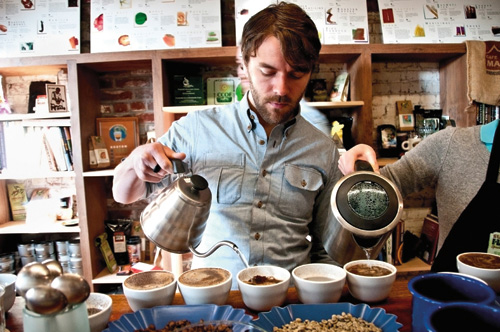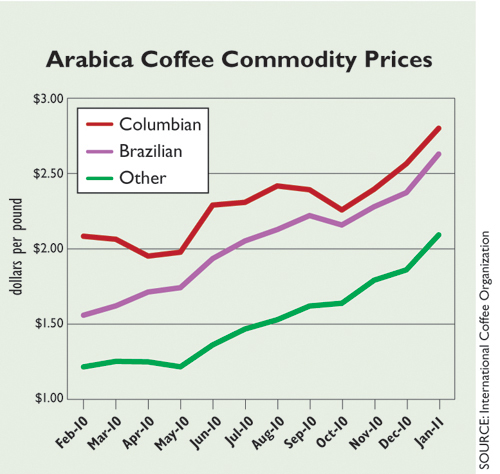 Raw coffee beans are getting more expensive. Whether or not the price you pay at the local café or grocery story for roasted beans or coffee has increased because of it depends largely on where you buy them.
Raw coffee beans are getting more expensive. Whether or not the price you pay at the local café or grocery story for roasted beans or coffee has increased because of it depends largely on where you buy them.
 |
Adam McClellan at Sustainable Harvest says rising costs challenge local roasters to maintain quality. // Photo by Teresa Meier |
 |
Raw coffee beans are getting more expensive. Whether or not the price you pay at the local café or grocery story for roasted beans or coffee has increased because of it depends largely on where you buy them.
Stumptown, Ristretto Roasters and Portland Coffee Roasters have increased prices to varying degrees on both roasted beans and drinks; Whole Foods has maintained prices on its premium line, Allegro Coffee, but has passed on the increases from its wholesale accounts with local roasters.
“I’ve seen some of the local roasters certainly being challenged with the market price,” says Bonnie Meyer, the regional coffee and tea coordinator for Whole Foods. But, she says sales of the higher-quality beans haven’t been significantly affected at her stores. “I think customers are willing to pay a little bit more to support their local favorites.”
Arabica beans, the variety almost exclusively used by premium roasters, increased by 54.8% per pound from February 2010 to January 2011. Industry professionals disagree on what is the driving force behind the increase, citing increased demand from emerging markets, bad weather, low production and commodities spectulation.
Aleco Chigounis, a buyer for Portland-based Stumptown, says premium buyers are having an increasingly difficult time securing high-quality beans because they now must compete with the high prices farmers can get by selling their beans on the open market, without fretting over quality controls that companies like Stumptown have built their reputations on. Competition has increased from large buyers such as Nestle and Kraft — even at the higher price points once exclusive to high-quality buyers. “So now with this crazy spike, since August or September, we’re starting to notice that there are a lot more players in our arena for coffee,” Chigounis says.
Adam McClellan, with Portland-based Sustainable Harvest, which works with small farmers around the world to source high-quality beans to North America, says the premium roasters for which Portland has become famous will have to work harder to maintain their quality distinction. “I think what you’re seeing is an even greater separation of what is specialty coffee,” McClellan says. “The small roasters are really well positioned to separate further that good quality, and people will keep paying for that.”

